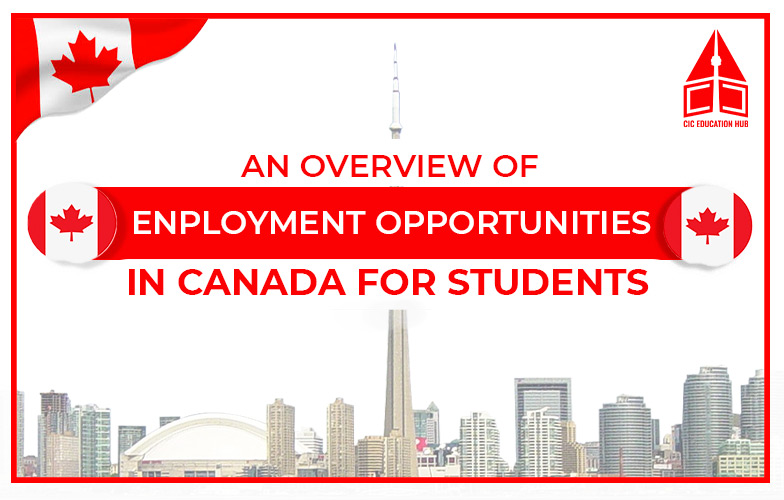The abundance of employment opportunities in Canada is what attracts many people from around the globe, especially international students. Finance or source of income is one of the major criteria accessed by students while choosing the country they want to study in. Apart from college fees, students also need to earn daily expenses such as food, accommodation, travel, and other personal expenses. Also, the fee structure for international students is higher than for Canadian nationals.
So, are you planning to study in Canada and lack knowledge of employment opportunities in Canada? If yes, you have reached the right place. CIC Education Hub has conducted intensive research on employment opportunities in Canada while studying in Canada and also after graduation. Based on our research, here we’ll provide you important details regarding employment opportunities in Canada for international students.
Job Opportunities in Canada for International Students

According to the Government of Canada, international students are allowed to work in Canada if their study visa or permit mentions that they are allowed to work either on or off-campus. Working while studying in Canada is strictly prohibited if you don’t have a legal work permit. The Canadian job market provides both full-time and part-time jobs for students in Canada.
Criteria for Working On-Campus
Working “On-campus” means you can work at all the buildings on your school/campus premise. If your school has more than one campus, you may only work at the campus where you’re studying. You can work at other locations rather than the campus you are studying if you’re working as a teaching or research assistant and if your work is related to a research grant. In such cases, you may work at a library, hospital, or research facility associated with your school. This can be outside your campus premise too.
You can work on your school campus, without a work permit, if:
- You are a full-time post-secondary student at a:
- public post-secondary schools, such as a college or university, or CEGEP in Quebec.
- private college-level school in Quebec that operates under the same rules as public schools, and is at least 50% funded by government grants.
- Canadian private schools that can legally award degrees under provincial law.
- You have a valid study permit, and
- You have a Social Insurance Number (SIN).
Criteria for Working Off-Campus
An international student studying in Canada can also work off-campus given that he/she fulfills the criteria mentioned by the government of Canada. Here are the criteria for working off-campus:

- You should have a valid study permit that allows you to work off-campus.
- You should be a full-time student at a college/university. Or, you should be enrolled in a post-secondary academic, vocational, or professional training program, OR secondary-level vocational training program (For Quebec only).
- Your study program should be at least 6 months long and lead to a degree, diploma, or certificate.
- You should have a Social Insurance Number (SIN).
While working off-campus you need to pay attention to the number of hours you can work per week as an international student. You cannot work off-campus if you are on authorized leave from your studies, or you’re switching schools and you’re not studying. But, you can always work again once you’re back to studying. The Canadian job market provides many off-campus part-time jobs for students in Canada. While working off-campus, you can look for the highest paying part-time jobs in Canada for students.
How many hours can you work off-campus?
An international student can start working off-campus as soon as the classes begin. During regular school semesters, you can get part-time jobs in Canada for up to 20 hours a week. And, during scheduled breaks like summer and winter breaks, you can work full-time. If your program doesn’t have scheduled academic breaks, you can’t work more than 20 hours per week. Also, note that you cannot work during a break that comes before you start your very first school semester.
Working after you complete your study program
There are 2 types of work permits you can obtain if you want to work in Canada after completing your study program:
1. Openwork permits
An open work permit allows you to work for any employer in Canada, except for an employer:
- Who is listed as ineligible on the list of employers who have failed to comply with the conditions or
- who regularly offers striptease, erotic dance, escort services, or erotic massages
2. Employer specific work permit
An employer-specific work permit allows you to work according to the conditions on your work permit, which include:
- The name of the employer you can work for
- How long you can work
- The location where you can work (if applicable)
There are numerous job opportunities in Canada for international students after they have completed their study program. You can work full time after completion of your study program if:
- You have received written confirmation from your current school that you completed your program.
- You have already applied for a work permit before your study permit expired.
- You have received a letter of acceptance to a new full-time study program at a college/university.
- You will start your new program within 150 calendar days of receiving the confirmation that you completed your previous program.
- You are waiting for a decision on your work permit application.
How to Search for Employment Opportunities in Canada?

The Canadian job market provides numerous job opportunities in Canada to international students who have graduated from colleges/universities in Canada. Employment opportunities are abundant in many cities and provinces in Canada as the country is facing labor shortages in important sectors and industries. Canadian employers are eager to hire qualified and responsible workers, be it national or foreigners for both full-time and part-time jobs in Canada.
How to get a job in Canada? Here we will guide you on how to search for employment opportunities in Canada.The first thing you need to do in your job search process is to prepare your resume and cover letter. Then, you can start applying for jobs through job sites in Canada. Here are some of the job search sites in Canada where you can find the best jobs in Canada.
- Go2HR
- Craigslist
- Eluta.ca
- Indeed.ca
- JobBank
- WorkBC
- Monster.ca
- Workopolis
- Wow jobs
- Good Work
Apart from this, you can also check out the websites of companies you are interested in for employment opportunities in Canada. There also is a “hidden job market”, based on recommendations so you need to work on developing your network and make connections with people that might help you.
If you have any other queries regarding study and working while studying in Canada, please feel free to schedule a consultation meeting with us. We’ll definitely guide you in the right direction.
You might find our following blogs helpful:-
More Details: Top 9 Reasons For Studying In Canada | CIC Education Hub
More Details: Everything You Need To Know About The Canadian Student Visa
